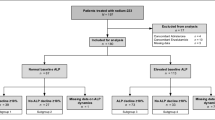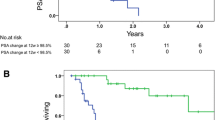Abstract
Purpose
A transient rise in prostate-specific antigen (PSA) after the initiation of chemotherapy, called as PSA flare, has been frequently reported in patients with castration-resistant prostate cancer (CRPC) but there has been no way to differentiate PSA rises in CRPC. We investigated whether bone-related serum markers differentiate PSA flare from progression in CRPC patients with bone metastasis.
Methods
We reviewed CRPC patients with bone metastasis who received systemic chemotherapy from 2002 to 2008. Pretreatment baseline and follow-up data including age, performance score, PSA, Gleason score, alkaline phosphatase (ALP), calcium level, and hemoglobin were evaluated. Pretreatment parameters and follow-up serum parameters after the first cycle of chemotherapy were included in statistical analyses.
Results
PSA increased in 38 patients (45.8 %) at the first evaluation after chemotherapy. Among the PSA rises, PSA increased continuously or did not decrease to the stabilization level by the third evaluation in 22 (26.5 %) patients, while PSA decreased to the stabilization or response level by the third evaluation in 16 (19.3 %). PSA flare occurred in 17 (20.5 %). The univariate analyses showed that no baseline parameters were associated with PSA flare, but the initial ALP decrease, changed ALP ratio, and median calcium level were significantly associated with PSA flare (p = 0.001, p = 0.008 and p = 0.012, respectively). Multivariate logistic regression analysis showed that a change in the ALP level is an independent predictive factor for PSA flare (p = 0.017).
Conclusions
ALP is a useful biomarker to differentiate PSA flare from early PSA progression during docetaxel chemotherapy in CRPC patients with bone metastasis.



Similar content being viewed by others
References
Akimoto S, Inomiya H, Furuya Y et al (1998) Prognostic value of the serum levels of bone formation and bone resorption markers in prostate cancer patients with bone metastasis. Eur Urol 34:142–147
Armstrong AJ, Febbo PG (2009) Using surrogate biomarkers to predict clinical benefit in men with castration-resistant prostate cancer: an update and review of the literature. Oncologist 14:816–827
Berruti A, Cerutti S, Fasolis G et al (1997) Osteoblastic flare assessed by serum alkaline phosphatase activity is an index of short duration of response in prostate cancer patients with bone metastases submitted to systemic therapy.Gruppo Onco Urologico Piemontese (G.O.U.P). Anticancer Res 17:4697–4702
Bubley GJ, Carducci M, Dahut W et al (1999) Eligibility and response guidelines for phase II clinical trials in androgen-independent prostate cancer: recommendations from the Prostate-Specific Antigen Working Group. J Clin Oncol 17:3461–3467
Chang SS, Kibel AS (2009) The role of systemic cytotoxic therapy for prostate cancer. BJU Int 103:8–17
Coleman RE, Major P, Lipton A et al (2005) Predictive value of bone resorption and formation markers in cancer patients with bone metastases receiving the bisphosphonate zoledronic acid. J Clin Oncol 23:4925–4935
Debes JD, Tindall DJ (2004) Mechanisms of androgen-refractory prostate cancer. N Engl J Med 351:1488–1490
Demers LM, Costa L, Lipton A (2000) Biochemical markers and skeletal metastases. Cancer 88:2919–2926
Fossa SD, Vaage S, Letocha H et al (2002) Liposomal doxorubicin (Caelyx) in symptomatic androgen-independent prostate cancer (AIPC)—delayed response and flare phenomenon should be considered. Scand J Urol Nephrol 36:34–39
Heidenreich A, Sommer F, Ohlmann CH et al (2004) Prospective randomized phase II trial of pegylated doxorubicin in the management of symptomatic hormone refractory prostate carcinoma. Cancer 101:948–956
Jemal A, Siegel R, Ward E et al (2007) Cancer statistics 2007. CA Cancer J Clin 57:43–66
Lein M, Wirth M, Miller K et al (2007) Serial markers of bone turnover in men with metastatic prostate cancer treated with zoledronic acid for detection of bone metastases progression. Eur Urol 52:1381–1387
Mulders PF, Schalken JA (2009) Measuring therapeutic efficacy in the changing paradigm of castrate-resistant prostate cancer. Prostate Cancer Prostatic Dis 12:241–246
Nakashima J, Ozu C, Nishiyama T et al (2000) Prognostic value of alkaline phosphatase flare in patients with metastatic prostate cancer treated with endocrine therapy. Urology 56:843–847
Nelius T, Klatte T, de Riese W et al (2008) Impact of PSA flare-up in patients with hormone-refractory prostate cancer undergoing chemotherapy. Int Urol Nephrol 40:97–104
Olbert PJ, Hegele A, Kraeuter P et al (2006) Clinical significance of a prostate-specific antigen flare phenomenon in patients with hormone-refractory prostate cancer receiving docetaxel. Anticancer Drugs 17:993–996
Parkin DM, Bray F, Ferley J et al (2005) Global cancer statistics, 2002. CA Cancer J Clin 55:74–108
Pelger RC, Lycklama A, Nijeholt GA et al (1996) The flare in serum alkaline phosphatase activity after orchiectomy: a valuable negative prognostic index for progression-free survival in prostatic carcinoma. J Urol 156:122–126
Pelger RC, Lycklama A, Nijeholt GA et al (2002) The flare in alkaline phosphatase activity post-orchidectomy predicts which patient may benefit from early chemotherapy in metastatic prostate cancer. Prostate 50:119–124
Sella A, Sternberg CN, Skoneczna I et al (2008) Prostate-specific antigen flare phenomenon with docetaxel-based chemotherapy in patients with androgen-independent prostate cancer. BJU Int 102:1607–1609
Smith MR, Cook RJ, Coleman R et al (2007) Predictors of skeletal complications in men with hormone-refractory metastatic prostate cancer. Urology 70:315–319
Therasse P, Arbuck SG, Eisenhauer EA et al (2000) New guidelines to evaluate the response to treatment in solid tumors. European Organization for Research and Treatment of Cancer, National Cancer Institute of the United States, National Cancer Institute of Canada. J Natl Cancer Inst 92:205–216
Thuret R, Massard C, Gross-Goupil M et al (2008) The postchemotherapy PSA surge syndrome. Ann Oncol 19:1308–1311
Tsui KH, Wu L, Chang PL et al (2004) Identifying the combination of the transcriptional regulatory sequences on prostate specific antigen and human glandular kallikrein genes. J Urol 172:2029–2034
Tsui KH, Feng TH, Chung LC et al (2008) Prostate specific antigen gene expression in androgen insensitive prostate carcinoma subculture cell line. Anticancer Res 28:1969–1976
Vaishampayan U, Hussain M (2008) Update in systemic therapy of prostate cancer: improvement in quality and duration of life. Expert Rev Anticancer Ther 8:269–281
Conflict of interest
There is no conflict of interest.
Author information
Authors and Affiliations
Corresponding author
Rights and permissions
About this article
Cite this article
Han, K.S., Hong, S.J. Serum alkaline phosphatase differentiates prostate-specific antigen flare from early disease progression after docetaxel chemotherapy in castration-resistant prostate cancer with bone metastasis. J Cancer Res Clin Oncol 140, 1769–1776 (2014). https://doi.org/10.1007/s00432-014-1710-7
Received:
Accepted:
Published:
Issue Date:
DOI: https://doi.org/10.1007/s00432-014-1710-7




